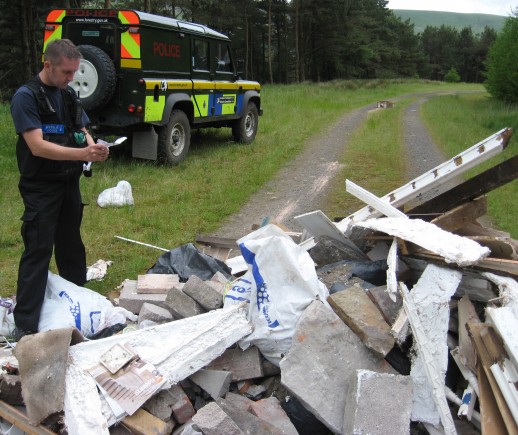A new guide with tips on how to tackle crime in the woodlands of Wales has been launched by Forestry Commission Wales.

The leaflet – A Guide to Dealing with Woodland Crime in Wales – is in response to rising levels of crime and anti-social activities in woodlands and is supported by all four Welsh police forces.
This support will be endorsed at the event by Chief Superintendent Gwyn Thomas, the chair of the All Wales Wildlife Crime Enforcement Group.
He said, “This guide will help woodland owners and managers to deal with the effects of crime and anti-social behaviour and also identifies steps that can be taken to work with others to address and reduce the problems.”
The guide contains information on what to do if you find evidence of crime and offers useful tips on how to help identify culprits who use our woodlands as an illegal dumping ground.
Peter Cloke, FC Wales Deputy Forest District Manager in South Wales, said, “Crime and anti-social activities affect woodland owners and managers and those who work in or use woodlands for recreation.
“Our woods define the special landscape character of Wales but the people who perpetrate these acts have no thought for the damage they cause to the countryside.”
Woodland owners and managers and members of community woodland groups sometimes find themselves dealing with the aftermath of crime or may witness people committing crimes.
Problems include fly-tipping, illegal use of motor vehicles, theft and criminal damage. When such incidents occur, the guide clarifies how to deal with them and the procedures for gathering evidence to assist in identifying and, hopefully, prosecuting offenders.
It also identifies when woodland can be classified as a public place where the police, Environment Agency Wales and local authorities have powers to deal with criminal and antisocial activities.
There is also a list of people to contact in the event of a crime and advice on how woodland owners and managers can work with the police and other agencies.
Peter added, “We have found that working with other organisations such as Environment Agency Wales has made a real difference to dealing with and preventing crime in the woodlands we manage.
“This way of working is brought out in the guide and, by following it, we’re confident other woodland owners and managers will see an improvement.”
The guide was drawn up in association with a number of groups including ConFor, Llais y Goedwig, Coed Cymru, the Wales Forest Business Partnership and Coed Cadw (the Woodland Trust in Wales).
Kath McNulty of Confor said, “Crime is a problem for many woodland owners and managers and this guide will be of real value to anyone who has to deal with it.”
Download a copy here